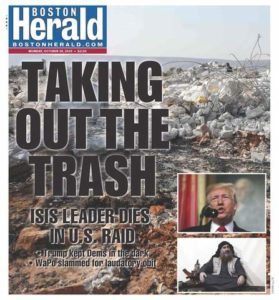I began this post a while ago and did not have a chance to finish it until now, so it’s a bit out of date. Despite this, I am still going to weigh in with my thoughts on a controversy in which student journalists at Northwestern University apologized for… practicing journalism.
This situation arose when former Attorney General Jeff Sessions visited campus, and many students decided to protest. Some of the protesters voiced their opinions peacefully, while others decided to climb through the windows of the lecture hall and forcibly push their way inside to disrupt Sessions’ speech. Two student reporters with the Daily Northwestern had the audacity to interview people in the crowd outside. Afterwards they also used a school directory to look up phone numbers of students involved in the protest and ask them if they would be willing to be interviewed. Additionally, during the protest, a student photographer took pictures of the clash between protesters and police and posted these to Twitter.
“I snapped into the journalistic response of making images,” the photographer, Colin Boyle, explained. “I was just trying to tell the story of what was going on… If something happened, God forbid, I was the only camera that was non-police-owned in that area, to my knowledge.”
Sounds reasonable to me.
However, student activists quickly began making a brouhaha, complaining that the publication of their names and identities might enable the university to punish them for their actions. As a result, the paper redacted a protester’s name from their story and Boyle deleted any tweets with photos showing protesters’ faces.
The Daily Northwestern‘s editorial board apologized in an editorial, which read,
We recognize that we contributed to the harm students experienced, and we wanted to apologize for and address the mistakes that we made that night. Some protesters found photos posted to reporters’ Twitter accounts retraumatizing and invasive. Those photos have since been taken down.
In my opinion, the newspaper has absolutely nothing to apologize for. They made no mistakes by covering the protest; the true mistake was to take down the content and to apologize.
When someone chooses to participate in a public protest, they are protesting, well, publicly. And integral part of participating in a protest is the fact that you are in public, and therefore will be seen and potentially photographed by people. It makes no sense for a protester to object to being photographed. If anything, protesters should want as much media coverage as possible, since drawing attention to one’s message and cause is the main purpose of a protest.
Additionally, the students who disrupted Sessions’ speech deserve to be punished, and anything that makes it easier for them to be identified and held accountable for their actions is a good thing, not a bad thing. Disrupting a speech is not OK. It is not fair to the speaker or to the people who have come to hear the speech. For a mob of people to drown out the views of a person with whom they disagree is bullying.
Contrary to the words used in the Daily‘s editorial, the anti-Sessions protesters did not experience any harm as far as I can tell, nor were they traumatized. How is it traumatizing that a person with whom you disagree is giving a speech? How does it cause harm? Anyone who did not wish to hear Sessions’ words could simply have chosen not to attend his speech. If anyone was harmed or traumatized, it would be Sessions and the people who went to the lecture hall hoping to hear him speak. The protesters went out of their way to cause a conflict. They are the aggressors in this situation, not the ones traumatized or harmed. They do not have a right to avoid punishment for their actions, and the newspaper and its reporters should not have modified, redacted, or taken down any of their reporting to accommodate them.

